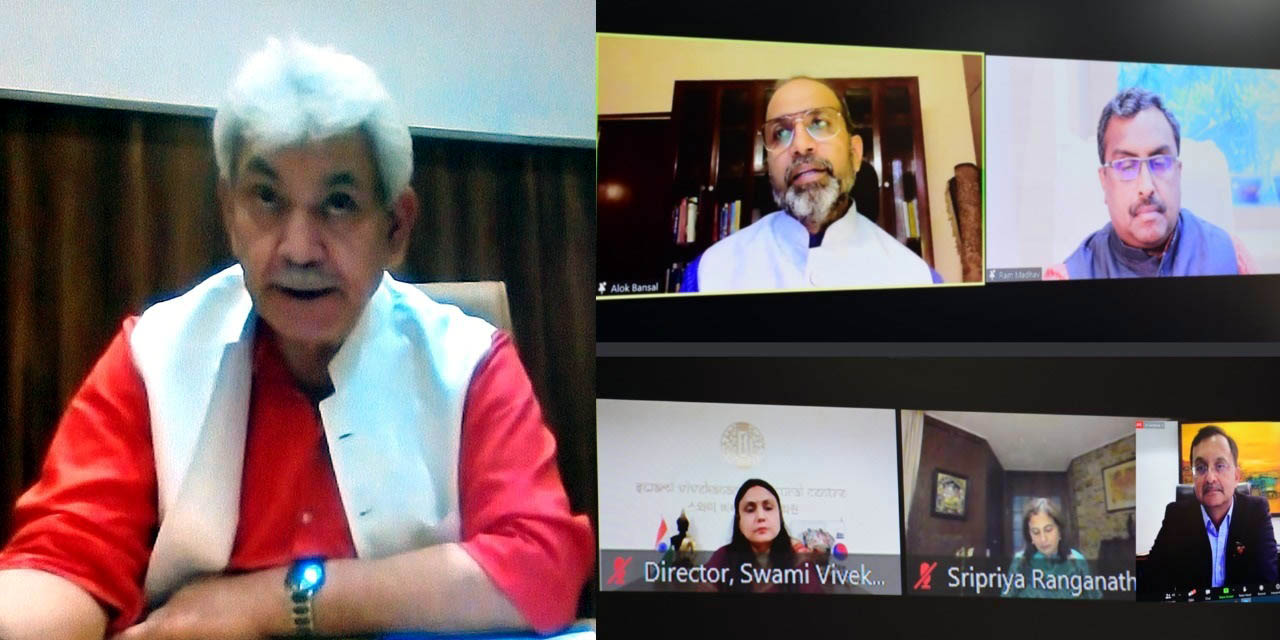
‘Development was hindered through artificial barriers’
Excelsior Correspondent
NEW DELHI, Aug 24: Lieutenant Governor, Manoj Sinha today addressed the valedictory session of International Symposium on “Jammu Kashmir and Ladakh: Development Dynamics and Future Trajectories”.
The two-day long symposium was organized by Swami Vivekananda Cultural Centre, Embassy of India, Seoul, Republic of Korea in collaboration with Indian Council of Cultural Relations; Institute of East and West Studies, Yonsei University; India Foundation, and Jammu – Kashmir Study Centre.
Sharing Jammu and Kashmir’s journey towards development and prosperity, the Lt Governor observed that J&K’s development and growth model revolves around 4 P’s – Peace, Progress, Prosperity, and People-First.
J&K is an example of immortal organic composite Indian culture. The sense of cohesion that we see today is significantly contributing to equitable opportunity and strengthening integrated, accountable, and transparent governance, said the Lt Governor.
Despite the country emerging as the fastest growing economy, developmental speed and spread in J&K were hindered through artificial barriers. The three dimensions of sustainable development – economic growth, environmental sustainability, and social inclusion- were completely missing. Regional aspirations were neglected and accumulation of growth happened at the hands of a few, he added.
Speaking on the transformation taking place in J&K, the Lt Governor observed that the implementation framework based on SEED— Speed, Efficiency, Effectiveness, and Delivery has helped in creating a roadmap to achieve sustainable growth.
In my overarching policies for new Jammu Kashmir, priorities are clear – distributed growth model, better health facilities, skilled youth population, empowered women, prosperous farmers, rectifying past injustices and transforming this soil as a powerhouse of education and science, and turning the dream of socio-economic progress of all individuals into a reality, said the Lt Governor.
Development has replaced terror in Jammu Kashmir that our neighbor relentlessly exports. Large turnout during last year’s District Development Council polls demonstrated people’s belief in grass-root democracy and their urge to reap benefits of development that would come along with it, said the Lt Governor.
Throwing light on Governance & Administrative Reforms: The Way Forward to J&K’s Economic Growth, the Lt Governor observed that the UT is witnessing new dawn of growth in different sectors because of the reforms introduced to replace outdated, crumbling, and regressive systems. For the first time there is unprecedented accountability and transparency in the system, he added.
Highlighting some of the major initiatives taken by the Government for the socio-economic growth of J&K, the Lt Governor said that the government has adopted a targeted approach for the issues like poverty, nutrition, gender equality, quality education, skill development of youth and have ensured that benefits of schemes reach to the last mile for new distributed growth that is not limited to a select few.
During the past one year, we have created an inclusive policy ecosystem for transforming Jammu Kashmir’s major sectors including Industrial, power, agriculture and allied sectors which speaks volumes of structural changes that took place within UT in a very short span of time, observed the Lt Governor.
The UT Government has adopted a people-centric policy and multi-pronged strategy involving all necessary systemic interventions to create at least a million employment opportunities and support them through an enabling ecosystem, he said.
New Industrial Development Scheme offering Rs 28,400 Crores subsidy is attracting industrial investment. We have received a proposal of Rs 23,500 Crore private investment and by March next year, the number could go up to Rs.50,000 Crores.
The policy initiatives include high-density apple plantation, new clusters of cold storage, setting up of farmer-producer organizations in every district, promotion of intercropping, setting up of food processing units, GI tagging for Saffron of Kashmir, organic certification of Basmati rice of Jammu, integrated dairy development scheme have been taken to increase the income of our famers, create jobs, ensure food security and getting people to move back to agriculture.
Since the need of the hour is a massive upliftment of every potent sector and employment, the government’s focus is on IPS- Identity, Productivity & Security.
We are also in the process of strengthening the existing system and projects are being completed at a faster pace. This new developmental model of ‘Implementation first, announcement later’ is aimed at making Jammu Kashmir self-reliant in the energy sector by 2025, observed the Lt Governor.
We are focusing on six broader areas through ‘Mission Youth’ which will focus on Livelihood Generation, Education, Skill development, Career Counseling, Financial Assistance, and recreation including sports and entertainment. For providing a vibrant medium for youth engagement, Youth Clubs’ in every Panchayats is being established, besides several schemes like Hausla, Mumkin, Parwaz, LG Scholarship, LG Super 75, Umeed with appropriate and adequate infrastructure have been initiated, the Lt Governor added.
The Lt Governor also underlined the need to tackle conflict and human tragedy sweeping through South Asia with solid international cooperation so that the young generation does not fall victim to radical ideologies.
The influencers and decision-makers in the society should remember that peace will remain a crucial requirement for development and stability, he added.
Sripriya Ranganathan, Ambassador of India to Republic of Korea; Ram Madhav, Member Board of Governors, India Foundation; Jawahar Lal Kaul, President, Jammu & Kashmir Study Centre; Dr. Sonu Trivedi, Director, Swami Vivekananda Cultural Centre, Seoul; Captain Alok Bansal, Director, India Foundation; Participants from East and West Studies, Yonsei University were the part of the valedictory session of the Symposium.

